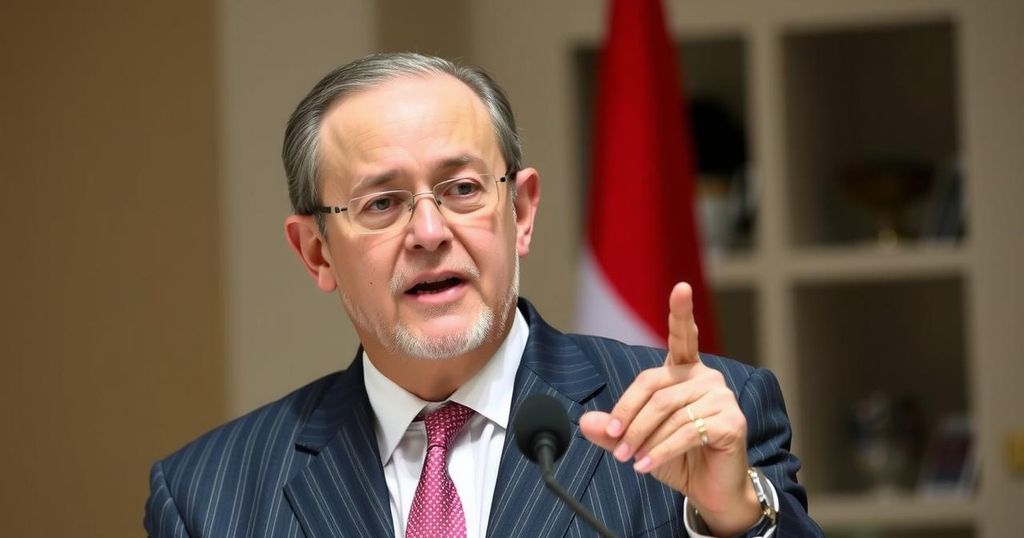Lebanon’s Presidential Election: A New Era Following Saudi Diplomacy

Lebanon elected Joseph Aoun as president following a Saudi-led diplomatic effort that resolved a prolonged political deadlock. His election marks a significant departure from Iranian influence, as Hezbollah lent support to Aoun while simultaneously facing pressure regarding disarmament. Amidst these changes, challenges persist for Aoun, particularly concerning internal stability and relations with Israel.
In a significant political development for Lebanon, the country successfully elected a new president following a last-minute diplomatic initiative from Saudi Arabia. Just before parliament was scheduled to vote, the political landscape in Lebanon was fragmented, with multiple contenders vying for the presidency. Amid growing concern over potential deadlock, a Saudi delegation, led by Prince Yazid bin Farhan, intervened and facilitated discussions among political factions. This effort culminated in the selection of Joseph Aoun as president, who garnered 99 votes, penetrating the required two-thirds majority.
Aoun’s election marked a pivotal moment and signaled a departure from the previous era dominated by Iranian influence via Hezbollah. The new president expressed a determination to usher in a ‘new era’ for Lebanon, which included plans to disarm militant groups, particularly Hezbollah. Notably, Hezbollah and its ally Amal party played a crucial role, casting their votes for Aoun following strategic discussions. This cooperative motion showcased Hezbollah’s nuanced position, demonstrating their willingness to engage in political consensus despite the risks it posed to their military stature.
The backdrop of Aoun’s election underscores a shifting power dynamic within Lebanon. Saudi Arabia’s renewed engagement stands in stark contrast to its previous disengagement from Lebanese affairs, highlighting a potential recalibration of regional alliances. Simultaneously, Hezbollah’s decision to support Aoun, while potentially undermining their military capabilities, hints at a complex interplay of political necessity and strategic pragmatism. Moreover, the circumstances surrounding Aoun’s election reflect the pressures exerted by international actors, with Western diplomats also actively influencing the process.
Amidst these changes, the challenges ahead for President Aoun are formidable, particularly concerning Hezbollah’s disarmament and the ongoing tensions with Israel. The need for stability and national cohesion in Lebanon remains urgent as Aoun assumes office. Nevertheless, the election of a president following a prolonged vacuum may inspire hope for a restored governmental order and dialogue nationally and internationally. Observers cautiously optimistic about Lebanon’s political future express sentiments that Aoun’s presidency could lead to improved governance and sustained socio-economic growth.
The political atmosphere in Lebanon has historically been characterized by sectarian divisions, often leading to prolonged presidential vacuums and instability. Lebanon’s presidency operates under a system requiring wide political consensus, a process frequently disrupted by the competing interests of various parties, including Hezbollah, which holds significant power. The involvement of external actors, particularly Saudi Arabia and the United States, has influenced Lebanese politics deeply, often determining the outcomes of leadership selections. In recent years, Iranian influence through proxy groups like Hezbollah has further complicated Lebanon’s political landscape. Joseph Aoun, a military leader, emerged as a candidate under U.S. backing amidst a fragmented political scene, making his eventual election noteworthy in the context of regional dynamics.
The successful election of Joseph Aoun as Lebanon’s new president represents a watershed moment in the nation’s tumultuous political history. With Saudi Arabia’s intercession and a strategic shift in support from Hezbollah, Aoun’s presidency could navigate Lebanon towards a path of governance and stability after years of division and foreign influence. However, the complexities of disarming Hezbollah and rectifying Lebanon’s internal conflicts present significant challenges for the future. The unfolding political developments will require astute leadership and sustained international diplomatic engagement to ensure Lebanon’s peace and prosperity.
Original Source: www.cnn.com








